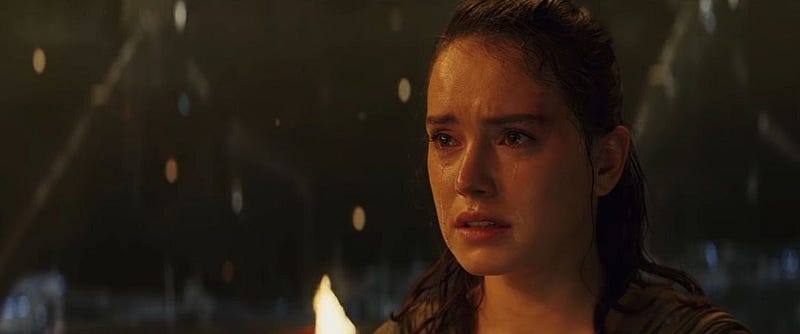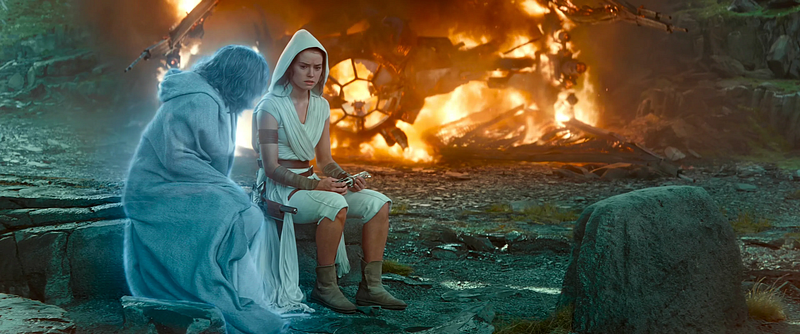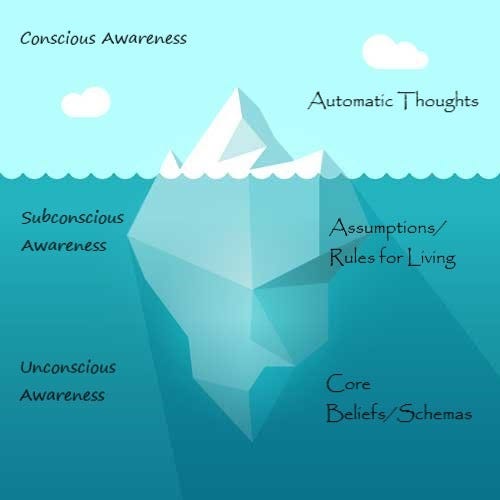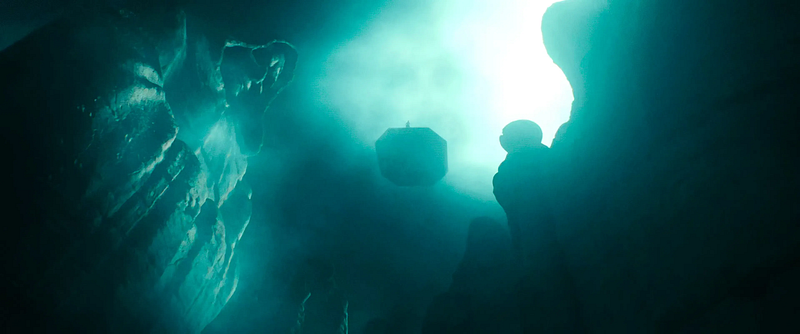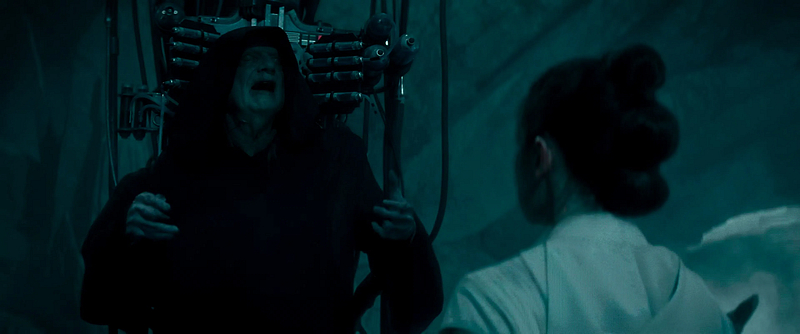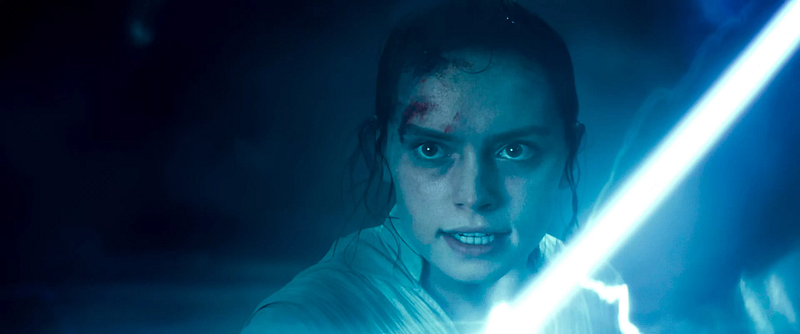- Time
- (Edited)
- Post link
Before you read the following essay, I should point out that most of what you are about to read is not mine; in fact, most of it was written by this guy on his Google Doc. I wanted to gain access to editing the document, but was unable to, so I decided to create an edited, more polished version, preserving much of the core of a lot of his work while also changing a lot of it to fit with how I see Rey’s arc.
I should also mention that this is also on Medium.com, you should go check it out as well.

(Rey Skywalker, as she appears in final film of the series’ Skywalker saga.)
Throughout this essay, we are going to explore as to what character arcs are and how they work, how human psychology and character arcs are intrinsically linked in that character arcs represent how people change on a psychological level, and how Rey’s arc is complex and profound.
Character arcs are, as its article on Wikipedia quotes, “the transformation or inner journey of a character over the course of a story,” with many of them involving the character overcoming an irrational, toxic core belief.
There are, typically, three variations of character arcs: positive, negative and flat; for this piece, only positive character arcs are going to be discussed, since they pertain to Rey.
Positive character arcs are the most common type of character arc, involving a character suffering from an irrational, toxic core belief and how they overcome it to become better as a person. Characters overcome these core beliefs in the climax of their respective stories, overcoming said core belief and coming to terms with a rational, healthy truth. Overcoming an irrational core belief is the basis of all great and complex character arcs.
Now… some might begin to see character arcs as being too simple and basic due to this, but this is merely an outline for character arcs; what the core belief is, whether the characters do overcome it or not, how the characters overcome it, and how it affects the characters are all free to the writer and audience (or, in the case of literature, reader).
In order to understand as to how these work in character arcs, one must understand as to what a core belief truly is…
Core beliefs are real, psychological concepts, within the field of cognitive behavioral therapy (CBT); basic beliefs held by anyone, whether real or fictional, about oneself, other people and their world, determining how one perceives and interprets their world.
Core beliefs start out during childhood as regular, conscious conclusions — as children, people learn about not only their world, but also themselves; consciously forming beliefs and mental constructs from observations, teachings from parental figures and their own conclusions and logic.
As stated, they start out as regular, conscious conclusions, but, because of this occurring during childhood — during which children are still developing as people —, are susceptible to becoming irrational, illogical, unhealthy, toxic and simply false.
Over time, up until adulthood, these regular conclusions become internalized — now an unconscious core belief, set in stone —, unconscious… consciously forgotten by you — you are unaware it even exists in the first place —, yet it still influences your conscious feelings and decisions.
Examples of core beliefs include one of self-worthlessness, another of self-incompetence and one more of self-unlovability.
Irrational core beliefs, such as the examples listed above, are usually the result of some sort of traumatic event one experiences during childhood; events such as these result in the child coming to some sort of irrational conclusion and forming a core belief from this.
Example #1:
George, a six-year-old boy, is abused by his parents and neglected, often being ignored and left alone.
George then irrationally not only comes to the conclusion but also forms the belief that neither he nor his problems matter; as George goes through adolescence, this belief becomes internalized, now an unconscious core belief.
Now, as an adult, George not only finds it difficult to speak to others about his own problems but is also extremely clingy and needy.
Example #2:
Amy, a five-year-old girl, tragically loses both of her parents in a car crash.
She then irrationally not only comes to the conclusion but also forms the belief that the outside world is a dangerous place; as Amy goes through adolescence, this belief becomes internalized, now an unconscious core belief.
Now, as an adult, Amy finds it very difficult to take risks or try new things and is content with being in a job she dislikes.
Example #3:
Billy is a five-year-old boy whose parents often made promises they could not keep and let him down a lot throughout his childhood.
He then irrationally not only comes to the conclusion but forms the belief that people are always going to let him down and that he should not trust anyone; as Billy goes through adolescence, this belief becomes internalized, now an unconscious core belief.
Now, as an adult, Billy is often paranoid in such an extreme way and finds it difficult to make friends and trust others.
In order to overcome a core belief, one must, first, acknowledge the existence of their core belief and understand it; then, they must reject the core belief, consciously, and come to terms with a truth.
So, “What does any of this have to do with character arcs, including that of Rey?” To sum it up, fictional characters suffer from core beliefs, similar to people in the real world. In fact, most character arcs, at their core, involves one suffering from, dealing with, acknowledging and rejecting an unconscious core belief, coming to terms with a truth.
It is for this reason character arcs succeed in being so relatable to people and useful for personal growth in our world — because characters (i.e. Rey) grow in a realistic and human way, dealing with their respective core beliefs.
So, “What is her irrational, toxic core belief? How does this hold her back, how does it affect her and how does she overcome it?” First things first, I am going to look at what it is not; neither her core belief nor arc are about parental figures, family and her actual parents; these are some of the biggest misconceptions and misinterpretations of the character of Rey and her arc.
True, Rey does find a found family within Finn, Poe, the Resistance and Leia — her master and surrogate mother —, but this is not what her arc actually is. It is not to say that neither of the above are aspects of her arc, they are, but it is to say that neither of them are the core of her arc; all of them are branches.
In fact…
Rey suffers from an irrational, toxic core belief of self-worthlessness.
Now, hold your horses. The usual response is that, “Rey seems confident in her abilities, how can she believe she’s worthless?” True, Rey does seem confident in her abilities, she even exclaims to Finn, “We’ve got one!”, when he asks if they have a pilot, referring to herself.
But this, however, is not the same as self-worth.
From what I have seen, some act as though self-worth and self-confidence are the same thing, which is incorrect — both of these often share a correlation, but can be and often are separate; Rey suffers from a core belief of self-worthlessness.
Of course, this does not prevent her from believing she is capable and from being confident. Her core belief, in fact, causes her to feel undeserving of, for example, becoming a Jedi, but it does not make her feel incompetent. The difference between low self-confidence and low self-worth is the difference between believing that you are able to be or do something and believing you are deserving or worthy of being or doing something.
“Is there evidence in the films that Rey holds this core belief?” Absolutely.
Before I do go into the symptoms and evidence of this, I should let you know that what follows has no mentions of anything from ancillary material (i.e. the film novelizations), since I agree with the notion that one should not have to go outside of a film and rely on ancillary material in order to repair any storytelling flaws so the film would make logical sense and be enjoyable by itself.
The following is a list of common symptoms someone held back by a core belief of self-worthlessness would experience (note, not all of them have to be checked off like a box; for example, some people diagnosed with a certain virus only suffer from specific symptoms whereas some have none):
Chronic psychological and emotional pain
During their initial encounter on Pasaana in The Rise of Skywalker, Kylo Ren describes Rey as having “such pain in [her].”
Feeling unworthy of being one’s ideal self
Rey shows in the first film that her ideal self is not a scavenger living among the sands of Jakku, but a hero; we see her wear a Rebel X-Wing helmet, we see her Rebel doll she had played with as a child, acting out the legendary stories she has heard about, and, most importantly, she looks up to the legendary heroes of the Jedi — namely, Luke Skywalker. However, she holds a definite feeling of unworthiness of being her ideal self. It is made clear during her introduction she dislikes being a scavenger; we are shown her looking at the old woman cleaning her scraps, just as Rey is, with sadness and a hint of worry and fear.
It is clear Rey wants to be more than a scavenger, yet she does not… she wants to be something, her ideal self as a Jedi, a hero… but despite this, she runs away from the call to action, when the Skywalker lightsaber calls out to her; then, she tries to displace this role to other people and, once she has finally been forced to take the mantle of being a Jedi during The Last Jedi, she states her feelings of unworthiness of it (“I will earn your brother’s saber…”).
It is only when she, encouraged by the Jedi of the past, has enough strength to stand against Palpatine and discard her core belief; she no longer feels unworthy of becoming and being her ideal self, all the Jedi — hence Rey declaring, “I… am all the Jedi,” pulling in the Skywalker saber (the symbol of not only a Jedi, but also her ideal self) and obliterating Palpatine. Rey declaring herself as “all the Jedi” is demonstrating her defeat over her core belief — as she finally feels worthy and deserving of being her ideal self, all the Jedi.
Misplaced and inappropriate outbursts of anger
Rey consistently shows excessive, inappropriate aggression and anger throughout the trilogy; one example is when she struck a defenseless and unarmed Luke Skywalker on the back of his head, another is when she stabbed an unarmed and defenseless Kylo Ren.
Excessively aggressive behavior
Overcompensating by trying to show their worth
Rey often tries to prove herself to others and puts on a mask of confidence; one instance is when she insists to Luke that she is not going to fail him in the way Kylo Ren did.
This is something Kylo Ren points out in The Rise of Skywalker, “You wanted to prove to my mother that you were a Jedi, but you’ve proven something else.”
Flashbacks of repressed, traumatic memory
Fear of responsibility and importance
Rey rejects the Skywalker lightsaber when Maz offers it to her, in fear of having any responsibility in the fight (especially after she was consoled by her and became calm after a series of scary Force visions) — something one with low self-esteem would feel.
Hasty formation of attachments
Rey instantly attaches herself to Han Solo in The Force Awakens, seeing him as the “father [she has] never had,” as Kylo Ren puts it; she even cries when Han is murdered in front of her eyes.
Validation and approval-seeking
Chronic feelings of irrational loneliness
Very self-critical (wrongly blames oneself)
Rey blames herself for Chewbacca’s apparent death, during one of her scenes with Finn in The Rise of Skywalker.
Denial of trauma that caused core belief to form
Need for approval is easily manipulated
Emotional fragility (overly emotional)
Rey begins to cry in The Last Jedi when Kylo Ren refuses to redeem himself and convinces her to join and rule with him.
Sense of aimlessness/not having a “place”
Inappropriately and unhealthily altruistic
Self-destructive behaviors
Most of these can be clearly and distinctly applied to Rey across the sequel trilogy; with actual, proper analysis and a real understanding of both Rey and this psychology, it is almost impossible to not see as to how she definitely holds a core belief of self-worthlessness.
Core beliefs have two types of “side-effects” on anyone. The core belief causes related feelings and emotions to arise in oneself (i.e. her core belief of self-worthlessness causes Rey to have a chronic feeling of worthlessness, sadness and pain — shown throughout the films with her crying, short-temper, rage and temptation by the dark side), and also causes the person to unconsciously act out coping mechanisms to help cope with the painful emotions and feelings that the core belief causes.
The feelings and internal pain that her core belief causes her are feelings such as chronic unworthiness, in-adequateness, loneliness (feeling as though no one understands you), general sadness and anger; because of the nature of film, characters’ emotions cannot be told to us directly, the way they can be in literature; however, these emotions are shown, indirectly, in characters through their actions, dialogue and acting (i.e. Rey).
It is important to notice that it is not the presence of these emotions, alone, that supports Rey having this belief, but it is the presence of these emotions in her, despite having no reason to; she feels unworthy of being a Jedi in the last film, despite showing capability and having support from the Skywalker twins and the Jedi texts. She has, as Kylo Ren describes, “such pain in [her], such anger,” despite having no reason to, other than a deeper, unconscious core belief, being the only explanation.
The coping mechanism Rey uses is a textbook for someone with this core belief — she suffers from psychological denial and repression, as it is revealed she acknowledged the entire time that her parents abandoned her and were murdered, she just hid it from herself. Kylo Ren tells Rey in the final two films, respectively, that she has “just hidden [the truth of her parents] away” and she “[remembers] more than [she says].” She also relies on others for validation to try and push back her feelings of self-worthlessness, but neither of them, of course — as with all other coping mechanisms —, address or help against the core of the issue… only its effects. As Kylo Ren says himself, she “can’t stop needing [her parents], looking for them everywhere in Han Solo, now in Skywalker.”
The following is a list of evidence of Rey having an unconscious core belief of self-worthlessness…
Rey willingly spends several years as a scavenger, despite acknowledging (“I see your eyes. You already know the truth…” — Maz), deep down, that her family is not coming back. (Self-sabotage/self-deprecation, denial and repression)
She is extremely emotionally fragile, breaking down into tears when confronted with any criticism or comments of her worth (“You’re nothing…” — Kylo Ren); such emotional fragility shows low self-esteem… a sign of this core belief. (Emotional immaturity, emotional displacement and misplaced, internalized anger)
She searches for approval, validation and affection from other people, including BB-8, Han, Luke and Leia, to make up for her own lack of self-value. (Validation and approval-seeking)
She forms attachments incredibly quickly, as an act of desperation and necessity. (Attachment disorder)
She consistently mentions feeling alone, lost, confused or scared (Luke asks, “What are you most afraid of?”, she responds, “Myself…”; she also describes having never felt so alone to Kylo Ren, among other examples). (Perceived inadequacy and feelings of being alone)
She holds general feelings of worthlessness, showing signs of feeling like she is not worthy of being or doing something great; she believes she is unworthy of wielding the Skywalker saber, then tries to get Luke and then Ben to be the hero to help the Resistance, believing she is unworthy of being said hero — it is only at the last minute when she has no other option but to take the mantle.
She holds general feelings of emptiness and inferiority, shown in the films through her emotional responses and general emotional state.
The above is evidence for Rey suffering from a core belief of self-worthlessness; having one or two of these “symptoms” would not really be enough, but the fact she shows most of the signs someone with the same background and core belief would have… supports this analysis, 100%.
Now that her core belief, as well as the core and heart of all character arcs, has been defined and explained, along with the effects this core belief has on her, as well as the defense mechanisms she uses to try and push these effects back… we can now explain her arc itself, how her core belief formed, how it is personified through Palpatine and how she overcomes her core belief.
Ever since her abandonment, Rey came to the conclusion that the only reason her parents could have abandoned her is if she is inherently worthless, and over the next several years of her life, up until adulthood, when her parents did not return for her, this belief became internalized, becoming an unconscious core belief — consciously forgotten by Rey, although it still influences her conscious feelings and decisions.
This core belief leeches off her feelings of happiness, and because of this she desperately relies on others for validation and approval, hoping for it to help her feel happy and push these nasty feelings of self-worthlessness away — this is the lie Rey believes, that worth only comes from other people, that she is only worth something if other people think she is, due to her low self-value; the truth is that self-worth comes from within and not from other people.
Her reliance on others for validation and approval is shown throughout the trilogy, for example she bypasses the compressor on the Millennium Falcon after Han Solo initially dismisses her, even literally spelling it out to him, only for him to shrug it off without caring, causing Rey to look disappointed — this implies she relies on others for validation, which, in turn, also implies she has low self-value.
Her arc itself starts off in The Force Awakens, during which we are shown Rey waiting for her family, believing they are going to come back to her someday — something established during her conversation with BB-8.
Of course, Rey meets Finn and the events proceed, up until she meets Han Solo, a man whom she has heard of as a famous smuggler — at first, he rejects her, and she bypasses the compressor, even literally spelling it out to him, only for him to shrug it off, causing Rey to look disappointed; this implies she relies on others for validation, which, in turn, implies she has a lack of self-value.
Eventually, she meets with Maz on Takodana, claiming to her that she “needs to get back to Jakku!” — here, Maz convinces her to accept the truth she has acknowledged the whole time yet has denied, that her family is not going to come back for her.
Rey comes to terms with this truth, as such, she begins to stop waiting for her family; instead of returning to Jakku, she is forced to join the cause and recruit Luke Skywalker so he would help the Resistance in their fight against the First Order — however, she is still held back by her core belief of self-worthlessness.
In The Last Jedi, Rey refuses to accept the truth that her parents, as Kylo Ren puts it, “threw [her] away like garbage…” — even going as far as denying this when Kylo Ren taunts her during one of their conversations —, instead having lied to herself for the past several years of her life that they truly cared for her, that she was worth something to them, that she was abandoned for some important reason which would “show” that her parents cared for her, reinforcing this lie as a way of ensuring it would not perish — henceforth helping her feel happy and thus pushing away her feelings of self-worthlessness.
Rey, however, is unsure as to what that “importance” exactly is, and thus hopes that if she does find out she is important then it would “show” that her parents loved her and abandoned her to, say, hide her in an act of protection.
It is, for this reason, she, for so long, has wanted to find out as to who her parents were, hoping to infer as to what her “importance” is, only so she would use it to reinforce her lie — and why she hoped for Luke to show her this “importance,” hoping to use that importance to justify her parents abandoning her; however, when Luke refused, she goes into the mirror cave, hoping for it to show her parents to her — by seeing her parents, she would get to see who they exactly were, and, in turn, infer as to what her “importance” exactly is, judging their appearances.
In the throne room aboard the Supremacy, Kylo Ren, having learned from their touching of hands as to how Rey wanted to find out who her parents were, as well as the truth of her parents, manipulates her into admitting said truth — in that moment, she begins to refuse her lie, coming to terms with the truth that her parents had no true reason for abandoning her, that they hated her, seeing her as nothing but a worthless piece of junk.
(At this point, Rey admits her parents were “nobody,” in the sense they had no important reason to abandon her, instead discarding her as though she is completely worthless; she has “no place in this story” in the sense that, again, her parents did not abandon her because she was of some “importance” and they loved her, they abandoned her because, to them… she is worthless.)
Because of this, she finally overcomes her “need” for her parents, learning to move on from and stop caring for her parents entirely — hence why she does not seem to be affected by the truth of her parents during the Battle of Crait; now, with no other option, with Luke having rejected her, with Kylo Ren being the bad guy, with Han Solo now dead, with her parents having thrown her away like garbage, she decides to attach herself to the Resistance and rely on them for validation.
In The Rise of Skywalker, Rey receives a vision of herself as a Sith, ruling on the Sith throne — she begins to fear the mere idea of her turning to the dark side, convinced that no one is going to give her approval if she were to turn to the dark side; hence why she begins to feel unworthy of being a Jedi and using a lightsaber, convinced she would become a Sith if she remains a Jedi and continues using a lightsaber.
On Pasaana, she engages in the Force tug-of-war with Kylo Ren, culminating with her giving into the dark side for the first time in the film itself, unleashing Force lightning onto the transport; she immediately assumes she had just killed Chewbacca — reinforcing her belief that she is going to be committing nothing but wrongdoings upon turning to the dark side and no one is going to give her validation anymore because of that.
Of course, Rey learns of a truth even worse than that of her parents throwing her away like garbage… she is Palpatine’s granddaughter — she begins to fear of what the wider galaxy would think of her if they find out who she is, since her grandfather is the Sith lord who not only destroyed the Jedi Order but also made the galaxy suffer under the rule of the Galactic Empire and was also responsible for the destruction of Alderaan.
Rey and the crew eventually head to Kef Bir and align the Sith dagger with the wreckage of the second Death Star, with help from C-3PO’s translation of the coordinates of its location and where to stand, to find out where the Wayfinder is located at, and she heads off alone. Upon touching the Wayfinder, she experiences a vision of herself as a Sith — reinforcing her fear of merely turning to the dark side.
Upon injuring Kylo Ren during their duel, she becomes convinced that her heritage is the thing that is causing her to continually give into the dark side — since this is the first time she had given into the dark side after she learned of the truth of her heritage. Because of this, she exiles herself, convinced she is meant to end up just like her grandfather, still held back by her belief that no one is going to give her approval if she were to become a Sith.
When she does exile herself, she throws the Skywalker lightsaber into the flames of the wreckage of Kylo Ren’s TIE Whisperer — reinforcing her feelings of unworthiness of using a lightsaber, convinced she is just going to turn to the dark side if she continues her duties as a Jedi…
(Rey and Luke Skywalker, having their pep talk on Ahch-To; where their respective self-exiles occurred.)
Luke Skywalker, aware of her heritage, shows up to her, catches the lightsaber and dismisses what she believes, explaining to her that her value is determined by her heart and not her heritage — proven to be true by Leia deciding to train her, despite how she has acknowledged who Rey truly was — and that said heritage does not define who she is and how her future is going to turn out, urging her to face her fear, confront Palpatine and save the galaxy; this convinces her that she is able to do the right thing, regardless of her heritage.
Right at this point is the first time Rey truly acknowledges the existence of her core belief of self-worthlessness and how it has been holding her back her entire life — when Luke informed her that, “Confronting fear is the destiny of a Jedi,” she applied this to her fear, that being her feelings of self-worthlessness.
Finally is the climax of The Rise of Skywalker, the sequel trilogy, her character arc and the Skywalker saga itself; Rey heads to the Sith Citadel beneath Exegol to confront Palpatine.
The climax of this arc, here, is extremely meta and symbolic, with a lot of deeper ideas and concepts represented through the story and actions of the plot, imagery, dialogue and symbolism.
Firstly, the Sith Citadel, beneath which Palpatine resides, is a representation of her own unconscious mind. As most people are aware, the mind has the conscious and the unconscious parts, and typically, in psychology, literature and most visualizations of the unconscious mind, it is described or shown to be below the conscious mind, dark, mysterious and hidden.
All four of these adjectives can be used to perfectly describe the Sith Citadel beneath which Palpatine resides and Rey finally meets him — this allows for the interpretation of the Sith Citadel representing her unconscious mind to be valid.
Secondly, Palpatine himself is the personification of Rey’s core belief. For one, he is literally beneath the Sith Citadel; in the same way, her core belief resides beneath her unconscious mind. On top of that, Palpatine quite explicitly tells Rey she is worthless, exactly how her core belief would (“You are nothing! A scavenger girl is no match for the power in me!”).
This, alongside how, traditionally, the “big bad” antagonist personifies the core belief of which the protagonist has to overcome, also allows for the interpretation of Palpatine representing her core belief of self-worthlessness to be valid.
With these interpretations established, I am going to explain as to how Rey finally rejects this irrational, toxic core belief and comes to terms with the truth, through her encounter with Palpatine.
In the climax of her arc and of The Rise of Skywalker, Rey travels to the Unknown Regions and lands on Exegol. From this point onward, Rey within the physical, literal story runs parallel to the psychological interpretation of herself venturing into her own unconscious mind.
Rey travels underneath the gigantic inverted structure and descends into the cold, dark abyss of the Sith Citadel — representing herself lowering and descending into the dark, hidden unconscious mind.
Within the Sith Citadel, Rey finds her way to a large, open arena where she is greeted by a decrepit figure, Palpatine himself, who tells her to submit to and give into him — representing herself, within her own unconscious mind, finding an old, buried core belief of self-worthlessness.
Here, Palpatine urges her to perform the Sith ritual; she must kill him, and by doing so this would allow his spirit to possess her body — she would become the Empress of the Sith. At first she refuses, but Palpatine warns her that the Resistance is in danger of annihilation by his forces, convincing her that, by becoming the Empress of the Sith, only she can prevent this from happening.
Convinced that the Resistance is going to be giving her validation for as long as she exists, ruling as the Empress of the Sith, she accepts his request — representing herself giving into her core belief of self-worthlessness as well as her lie that only others determine her value; Ben Solo, however, returns for her — proving to her that she is valuable, regardless of whether she becomes the Empress of the Sith or not; this allows her to refuse the ritual and stand aside Ben against Palpatine.
Palpatine, however, drains them of most of their life force (symbolic of how a core belief of self-worthlessness drains oneself of a life of happiness) to rejuvenate and strengthen himself, afterwards literally throwing Ben Solo into the chasm — Rey is left weakened and alone.
Feeling unable to defeat Palpatine on her own, she turns to the Jedi of the past for support; in response, they encourage her to try her best to defeat Palpatine, regardless of how puny she is in comparison to him — now, she has enough strength to not only refuse the lie she had believed her entire life, that she is worthless, that she is only worth something if other people think she is, but also rise and stand against Palpatine.
He dismisses her as nothing, no match for the “power in [him];” instead of succumbing to his remarks, she ignores them and responds back with her own, self-made sense of self-worth and self-esteem… that “she… is all the Jedi,” and the icing on the cake is that she has pulled in the Skywalker lightsaber, the weapon she has felt unworthy of using for so long — she finally feels worthy.
No longer held back by her irrational, toxic core belief that she is worthless, having come to terms with the truth that worth and acceptance comes from within and not from other people, Rey destroys Palpatine once and for all.
The ending of The Rise of Skywalker further reinforces how Rey is no longer held back by this core belief.
For one, when asked her name on Pasaana she simply responds that she is “just Rey,” when at that point she was still held back by her core belief, whereas on Tatooine, now no longer held back by her core belief, when asked her name, she responds, “Rey Skywalker,” — this implies Rey finally feels worthy of naming herself as a Skywalker.
Secondly, the sequence parallels her beginnings on Jakku, as a way of showing how much Rey has grown as a character up until this point; in the first film, Rey is held back by her core belief of self-worthlessness, spending her days on Jakku, hoping for her parents to come back so they would give her validation, helping her feel happy, thus pushing back her feelings of self-worthlessness — whereas at the end, Rey has already overcome her core belief, she is now happy and accepts herself, she no longer relies on other people for approval. On top of that, in the first film she looks at that old woman on Jakku with worry and fear, that she would end up having lived her life sad, whereas here she has matured, she looks at the old woman, this time knowing she would grow old happily, descriptive of her own self-value.
In short, Rey Skywalker suffers from an irrational, toxic core belief of self-worthlessness — this leeches off her feelings of happiness. To make herself feel happy and push back these feelings of self-worthlessness, she desperately relies on others for validation and approval, having no self-value whatsoever.
Throughout the sequel trilogy, she moves on from her parents altogether, and in the climax of her arc, the Jedi of the past encourage her to try her best and defeat Palpatine, regardless of how puny she is compared to him; now, she has enough strength to not only rise and stand against Palpatine but also overcome her feelings of self-worthlessness, complimented by her, no longer held back by this core belief, destroying him once and for all.
Over, and out.
